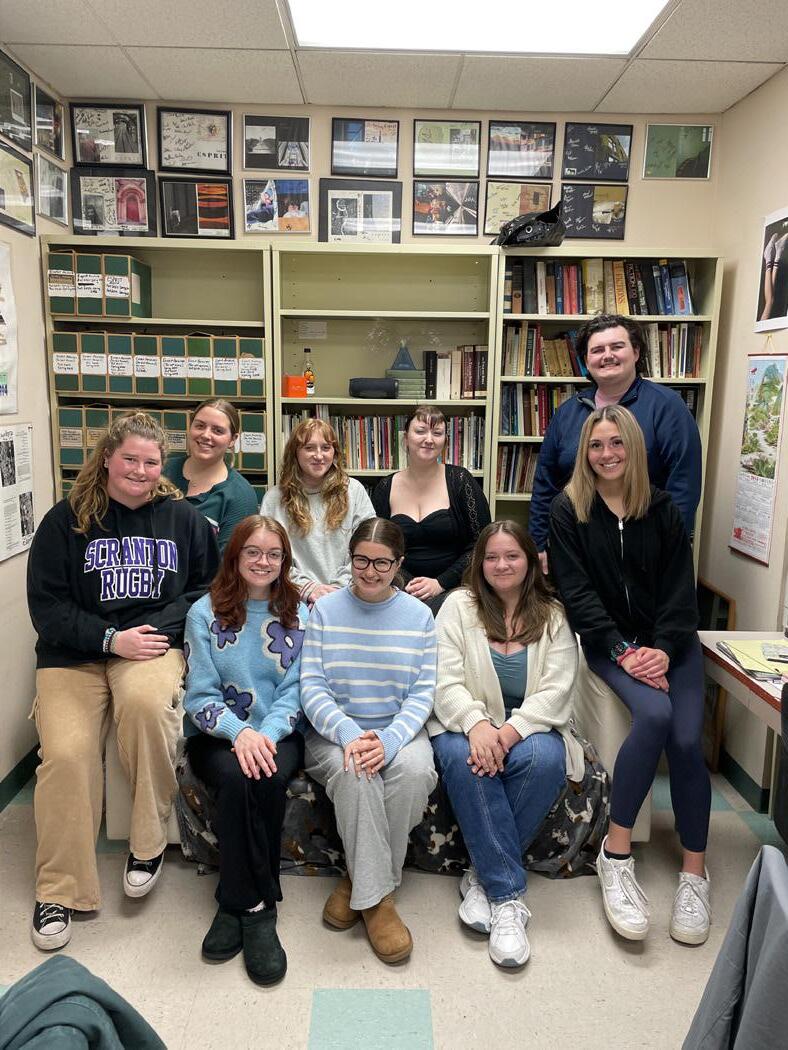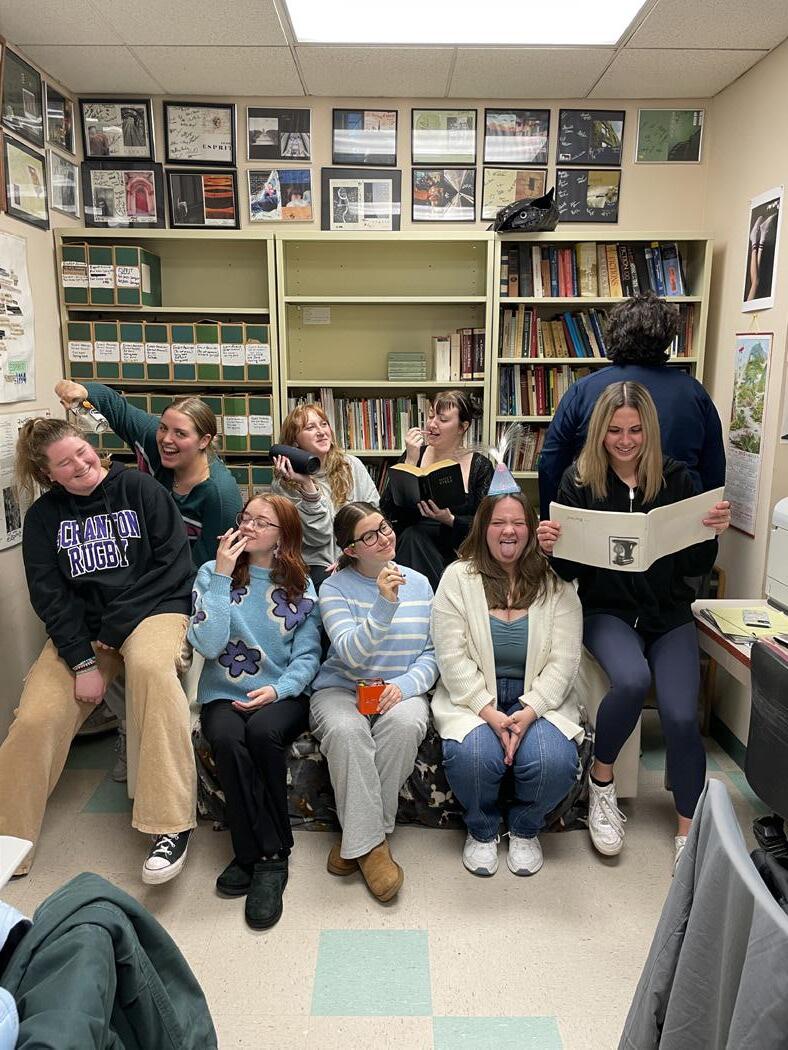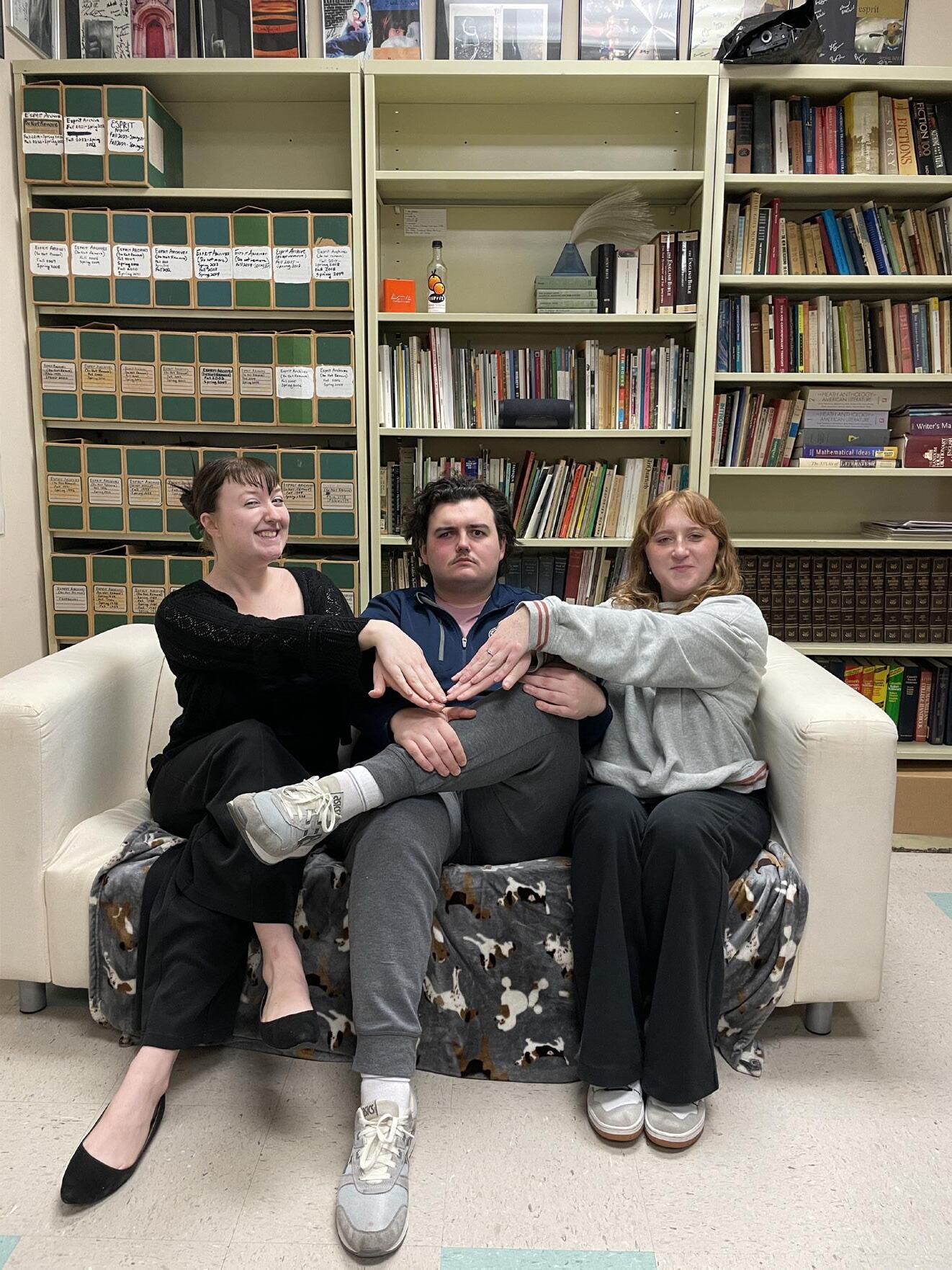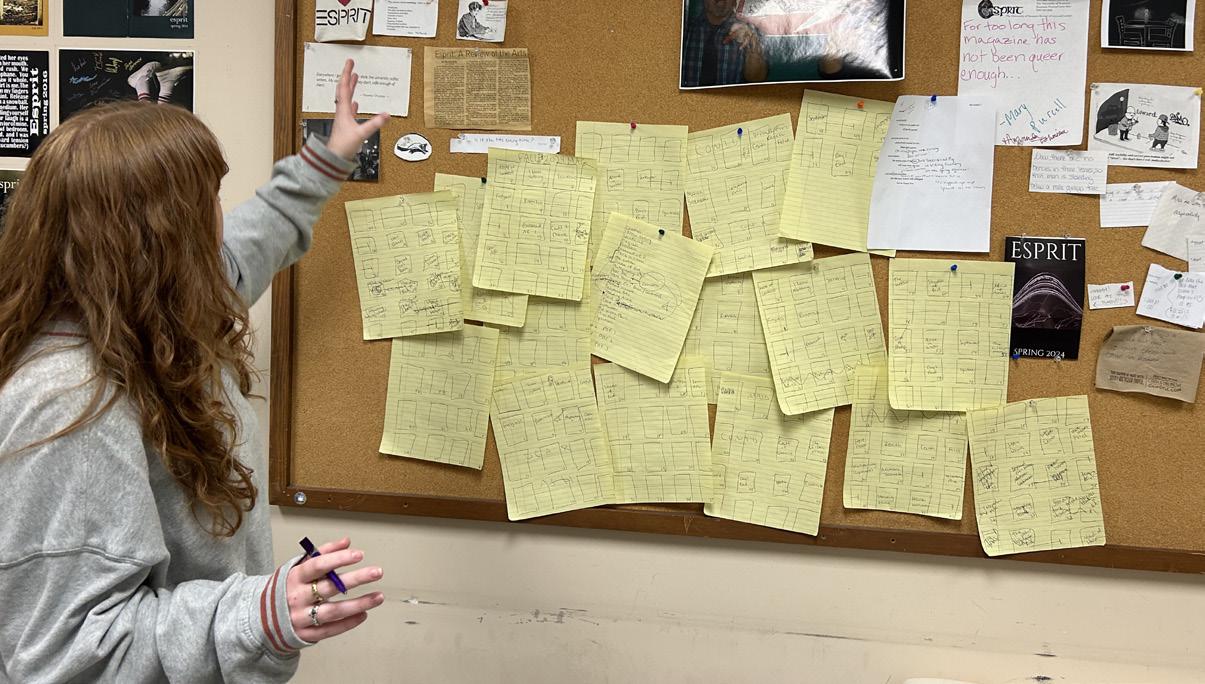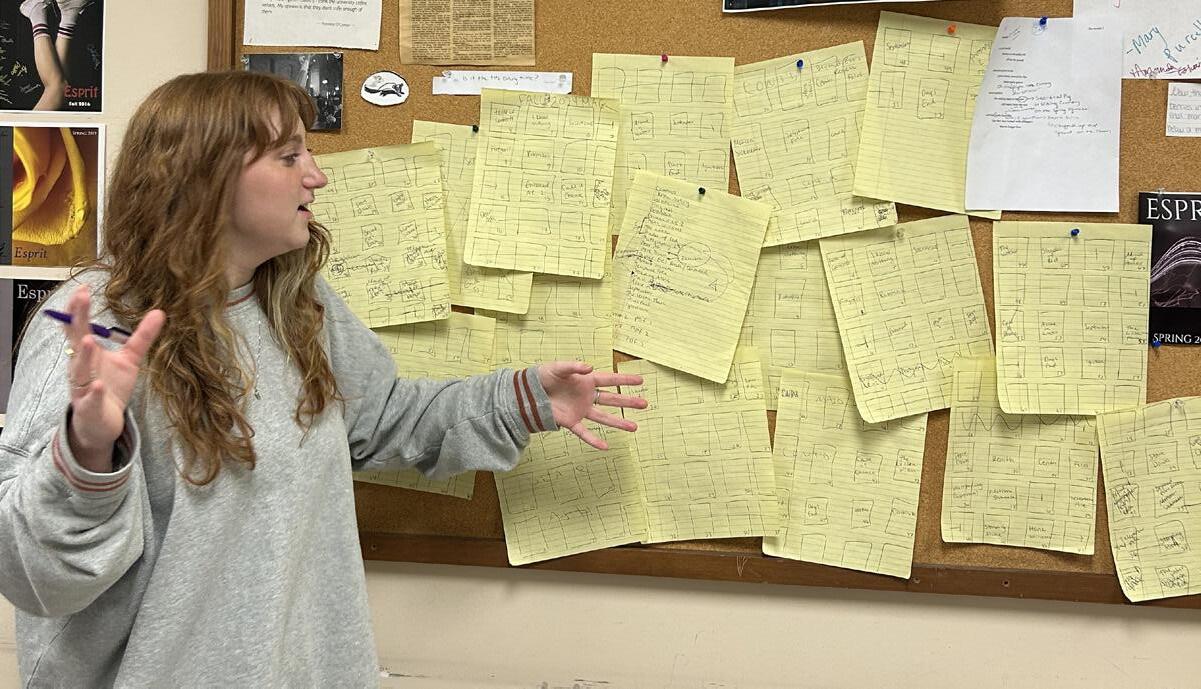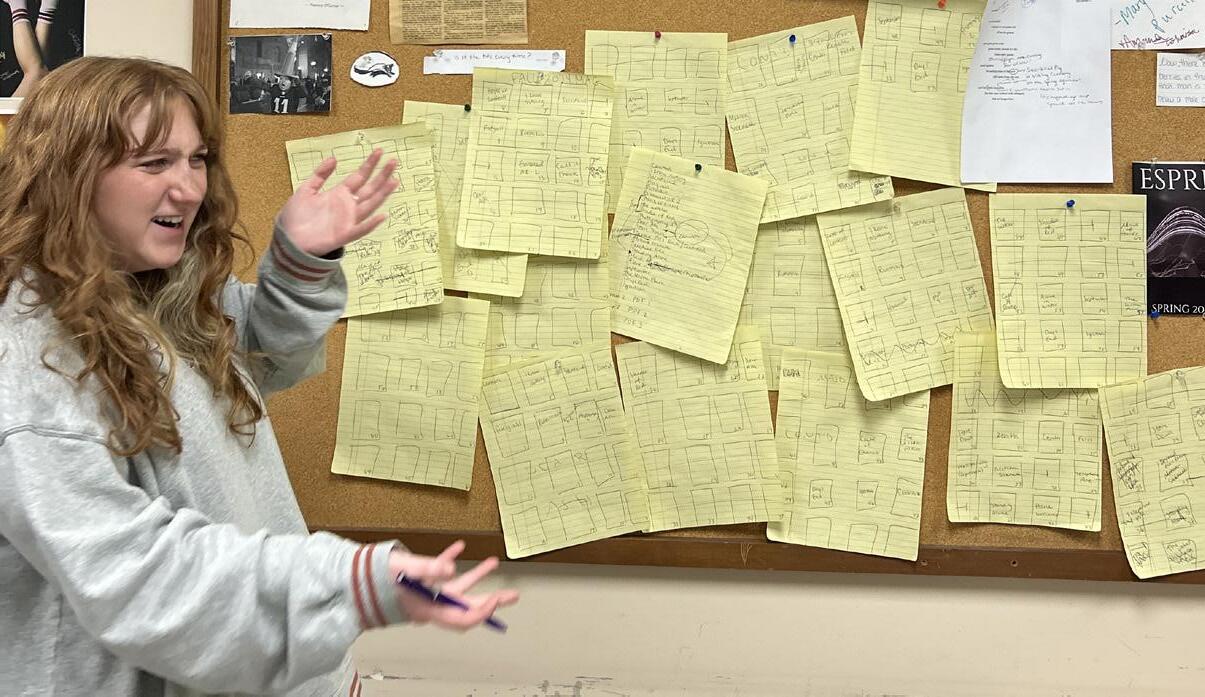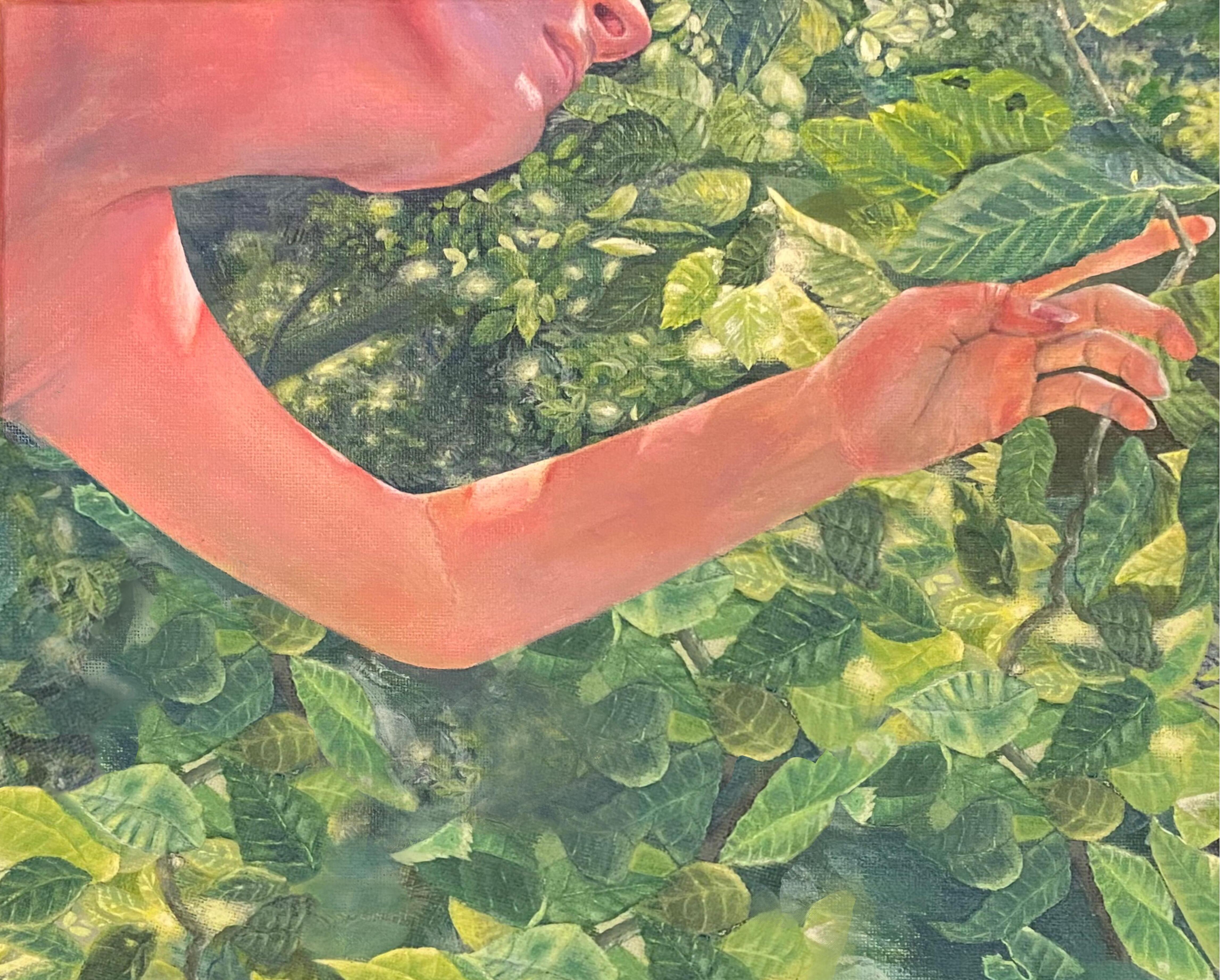

esprit
ESPRIT
The
University
of Scranton Review of Arts and Letters
Fall 2024
Editor-in-Chief
Zane Price
Production Manager
Skye Rutkowski
Technology Manager
Brenna Parker
Assistant Production Managers
Emily Carey, Adelle Confer, Callie Gorman, Kyra Malanowski
Faith Montagnino, Hailey Patts
General Editors
Emily Carey
Adelle Confer
Patrick DelBalso
Rebecca Doyle
Callie Gorman
Kyra Malanowski
Faith Montagnino
Liam Moran
Hailey Patts
Meghan Wong
Check-In
Melissa Eckenrode
Faculty Moderator
Stephen Whittaker
Esprit, a co-curricular activity of the Department of English and Theatre, is published twice yearly by the students of The University of Scranton. The content is the responsibility of the editors and does not necessarily reflect the views of the administration or faculty. The University of Scranton subscribes to the principle of responsible freedom of expression for its student editors.
Copyright by The University of Scranton, Scranton, PA 18510.
Fall 2024 Awards:
The Berrier Poetry Award
Brenna Parker
“Hank Williams and Running Away”
The Berrier Prose Award
Zane Price
“Dear Ash”
The Esprit Graphics Award
Jessica Ely
“Beyond Eve’s Reach”
Fall 2024 Award Judges:
Poetry:
Bethany Belkowski graduated from The University of Scranton in May 2024 with a B.A. in English and public policy & service. A previous member of SJLA and past Editor-in-Chief of Esprit, Bethany now works in the Pennsylvania House of Representatives. Under State Rep. Mary Jo Daley, she serves PA District 148, crafting office communications and providing constituent services.
Prose:
Katie Till is a recent alumni of the Esprit editorial team who graduated from the University of Scranton in 2024. She spends most of her time now in a lab at Thomas Jefferson University, where she is pursuing a PhD in biochemistry and structural and molecular biology.
Graphics:
Britney Walsh graduated from The University of Scranton in May 2024 with a B.S. in Biology. She served as a past Production Manager of Esprit. Britney is currently completing her M.S. in secondary education for biology at The University of Scranton as a Noyce Scholarship recipient and will teach in high-need schools across Pennsylvania.
Patrick DelBalso
Meghan Wong
Stephen
Shubhat Dhungel
Victoria
Zane
I Know Nothing
Patrick DelBalso
What should I write now?
I think I have writer’s block. I’ll just make stuff up!
I Know Nothing
Meghan Wong
I kneel before still statues— rusted stone, robes and rested smiles. You urge me to speak to my ancestors, tap into a hidden inheritance, let them detail my ancient architecture. Of the liquid gold beating through my veins.
I feel stone, but I hear the labor of store clerks, house cleaners, waiters, the layers of sediment I sit on now.
I cannot afford to become rubble. To preserve the writing engraved on my wrists, the sanctity of the iron pressing into my shoulders. I dream of yellow fortunes whispering missing lullabies, saying Unclench your fists.
Stone splinters under enough pressure.
I cannot help but submit to this statue. My organs pulled out for The length of a last name Blood of the covenant smeared, staining The walls of this shrine.
To be in awe of these stone pillars And fear the idea Of wasting such brilliant artistry.
I promise that I am striving for excellence. I beg of you—do not examine too closely; The rocks, so finely polished Have invisible fractures at the seams.

Firegrass - Stephen Butler
Faith Montagnino
“That doesn’t add up to 30.”
Sunlight streams through the glass table, warming my thighs under corduroy shorts. EJ sits across from me in one of the outside chairs, white paint chipping off onto his jeans. Mom just got new cushions from Bed Bath and Beyond; they’re navy blue with a white kaleidoscopic printed pattern.
“What do you mean?”
“To enter the game, you have to put tiles down that add up to 30.”
EJ sighs, his red hair waves against the current of the breeze. He places the tiles back on his tile-holder.
“Can we just play Uno?”
“Come on, give this a chance.”
My grandma’s Rummikub box rests half open between us, a joker tile squinting against the light.
The directions sheet, unread, flaps between an extra tile-holder and the lid of the box.
“Mia, I’ve been picking up tiles for like 3 hours!”
I laugh, he doesn’t. I laugh louder. He shadows a small smile with an eye roll.
“Oh, the horror, I’m beating you at something for once.” My blue 10, 11, and 12 tiles exchange sideways glances, smirking. We are old friends.
EJ stares intently at his tile-holder, his fingers tapping the blue plastic.
“I’ve got like 30 tiles here and yet none of them add up to 30.”
“Are you sure?”
“I swear.”
Rummikub
“Do you have multiples of any numbers? Like, three 10s, three 11s?”
“Yeah, I do, but they’re different colors.”
“They don’t have to be the same color.”
EJ shoots up to meet my eyes; his shoulders push back against the cushion.
“You’ve got to be kidding.”
I squeeze my lips to smother a giggle.
“You should’ve asked...”
“Evil. You’re evil,” he insists as an exasperated laugh splinters his “tough guy” bit. The blue, orange, and red 10 tiles clink on the glass.
“How do you win this thing?” he says with chewing mouth, digging into the barbeque chips.
“There it is, the ‘how do I win?’”
“I just want to know!”
“You’re the first player not to have any tiles.”
“Like Uno!”
“Like Uno.”
Orange 1, 2, and 3 ask the blues what SPF they wear; they tip their visors, say “haven’t you tanned enough?” Black 4, 5, and 6 slide across the glass, joined by a joker tile. She smiles at her friends, who smile back. “It’s been so long since I’ve felt warm.”
“This is your grandma’s game, right?” I’m shocked he remembers. Black 5 perks up at the sound of her name. I put down red 9, 10, 11, and 12, who wrap their arms around my fingers.
“Yes, we would play this for hours. Lainey’s better than me, but I’ve always loved it.”
EJ nods.
“You remember a lot.
“Of course I do,” he breathes, not looking up from the tileholder. “You learn a little after 15 years of friendship.”
Red 6, 7, and 8 join their cousins. “Friend?” they whisper, confused. “We are old friends,” I assure them.
Black 7, 8, and 9 settle into the creases of the glass table.
Rummikub
“How come you don’t play anymore?”
“Hmm?”
“In the sunroom, you said you haven’t played in forever. Why did you stop?”
Orange 4, 5, and 6 bring the oil.
“I really only ever played with my grandma,” I admit. The tiles stop chatting to listen.
“She got tired of it?”
“No, she got cancer.” The words come out sharper than I thought they would; the corners of Red 4 are cutting into my skin. I don’t remember picking him up.
“She’s not dead, just, you know, not alive, either.”
The joker tile’s eyes fill with tears. Black 4 wraps an arm around black 5, who lays his head on his shoulder.
“Jesus Mia,” EJ mumbles, “I know we don’t really see each other anymore, but you could have told me.”
“I know,” I muster, “I haven’t really told anybody. Just sucks.”
“You should’ve called.”
“I did. You’re here.”
EJ sighs, pushing back his chair. The metal of the chair scratches against the red brick.
“Before spring break.”
“I know.”
Blue 7, 8, 9.
“Mia, let’s talk about this.”
“We did. She has cancer. Life sucks and then you die.” I start arranging the tiles that remain on my tile-holder into color groups.
“Mia.”
“What? It’s true.”
“You need to get this off your shoulders, you need to-”
“-you need to put some tiles down.”
EJ lets out a deep, rooted breath. He stares at me expectantly.
“What?”
“I’m waiting.”
“No, I’m waiting. Your turn.”
“Your turn.”
“What do you want me to say?”
“Anything.”
“It sucks, ok EJ? It fucking sucks. Talking about it doesn’t make it better, it makes it more real than it already is. I get that you’re trying to support me, but I’m good.”
I slam a set of tiles onto the table. They stare at me, frightened and sad. I think of the girl with the peace sign t-shirt, who sat at a wooden table with her grandma one day and learned to love numbers. I remember the smell of my grandma’s kitchen, the way her wooden chairs left scratch marks on the faux tile. The way she’d always manage to spill her soda onto the floor during our games, which forced us to take TV breaks. Her laugh, her guiding hands over the tile-holder.
“Mia?”
I think of her now, in the hospital bed. The nurse looks me up and down and says, “family?” I nod as he leaves pills on the faux wooden table. She can’t open the soda can without help. I sit at the edge of the bed, one hand opening the can, the other resting on her left leg. “Do you want me to bring Rummikub next time?” I manage. She stares at me blankly, smiling after a few moments. She leans forward to squeeze my wrist. “Don’t stay too long,” she says, “the world is out there;” she tilts her head towards the yellowing window. I notice, then, her hearing aids, red lights blinking against the blue tile floor.
“Mia?”
EJ is next to me now, kneeling beside my chair.
“Let’s go see her.”
I let the tears greet his face as he hugs me. The tiles smile as we pack them up.
Rummikub

Christina Andreopoulos
Sitting on cold, metal steps
Last night of September
We watched a skunk and a raccoon chase each other
You swore they were fighting and I swore they were playing
And I finally saw how fine the line is between hate and love
(When my sister makes me laugh too hard, I start to cry)
(Between guttural sobs, I crack a smile)
Maybe the lines were never there
Maybe they’re fighting and playing
Maybe they hate and love each other
Maybe the only sin is indifference
And the only way to kill something is to starve it.
Anger and affection are both attention
Love and hate are
Both catalysts and cures for each other
There are no lines between us
We’re all just matter
Buzzing, reaching, grasping onto something to hate, and subsequently love.
Call it Chance

Photography 2 - Victoria Lewis
Zane
Price
Dear Ash,
I write this trying to see you through the clutter. All clutter clouds.
Through the bedroom window of our honeymoon cottage, I’m looking at your Subaru Ascent backdropped by those skyscraper pines you gawked at on the winding drive in. About ten minutes before we got here, you had said something about their being of spiritual importance to one native tribe or another. I apologize for not remembering. The melody of that candy voice of yours made meaning too sweet to savor. I wish I were using a pencil for I would erase that last line. I know you hate when I “speak in crayons and write in syrup.” Or at least you used to say that; haven’t heard it in a while.
Through the window and the windshield, I am looking at you take another gulp of the Bordeaux you bought on import. Sorry I cancelled the France trip. I’m glad to see you drinking it; wine is meant to be drunk. You’re shouting so I know it’s your mother on the other end of the line. The pillow you’re intermittently screaming into is one of the embroidered ones your Nan gave you before she passed. I hope you spill the bottle on its lace so you can begin to see why I did what I did.
Through the window and the windshield and your crying eyes, I try to see you though I’m sure I’ve never accomplished this. A quick apology for making you take your contact lenses out at the altar. I maintain that removing excess clutter at our most intimate moment was a virtuous stance, but your kissing my nose was embarrassing; I’m sorry you were embarrassing. I’ve never seen you in the sense I mention now, nor you your beloved Nan, subject of your drinking behind the wheel at 2 a.m., an hour we should be touching,
Dear Ash
probing, seeing.
If you find the above lines hard to read, it’s because Immy spilled my whiskey on the paper. I’m touching his whiskers in my left hand as I write this sentence. You don’t even look at Immy, his sensible black-red-blonde mane. When I look at Immy, I see Immy, and not just his doll-perfect eyes but his very feline soul: the ticktock of my kitty-cat. I once saw a person the way I see Immy. Maybe that’s the story that gets you from the steely Earth back to our honey Moon. I’ll write it out it after I go take a piss and refill my Jack.
I was stepping on the threads scattered by the bed as I made my way back to this desk. What once was is no more: obliterated, beyond repair. Know this: I am not sorry. I’ll apologize where applicable, as in I’m sorry I’m using your diary to write this letter in, but not for these thousand threads I wriggle now in my toes. For this, I am not “deranged” or “cruel” or any of the other defamations you hurled at me whose echoes still reverberate in tune off these log cabin walls. Instead, think of me, the me who was stark naked and engorged on this modest twin-size next to this hardwood desk, as a patient turned ophthalmologist. My cataracts are gone; I am trying to remove yours now, little phoenix.
To begin, an admission: I work for Dennis Popyrin. I’m sorry. When we met at Cooper’s, you were four pickletinis deep talking to [REDACTED], remember him, about your protest work on the Dakota Access Pipeline, remember that? My chiming in with, “I work for the guy you want dead” would not have been an optimal route into your pants that night. Since that night in your pants, and perhaps you should take this with a sense of pride, I’ve never found reason to get out of them. Now, the Popyrin umbrella is large, as you’ve mentioned constantly while combing through The Atlantic over breakfast for the last two years. I do not work nor ever have worked in his poultry empire, nor for any of his Malaysian textile shops, and I certainly was not privy to his funding of those insurrectionists in [REDACTED].
For the most part, I have not been lying; I work in cereal. “So does milk,” was the quip you made when I first told you this on Dear Ash
our second date at the Glider, and it’s the memory of your delivery somewhere between a John Mulaney shriek and a, sorry, Louis C.K. belch, that made me chuckle into my Jack just now; I’m sorry for the little whiskey dots like bomb craters above the “yzs” in [REDACTED]. Now, I have lied to you about being a cereal salesman of the greater Lackawanna and Luzerne County areas; I’m sorry I lied to you about being a cereal salesman of the greater Lackawanna and Luzerne County areas. In fact, I’ve operated as, and hopefully you can chuckle into your Bordeaux at this, a “Child Palette Scientist,” a job whose acronym already has its market cornered. For most of the last two years, my job involved mixing various sugar combinations and corn syrup extracts to create a viable Froot Loops contender. Take heart, as certainly I do now, Ash, in knowing that I never did bring any candied clutter to market. My CPS team’s only breakthrough was nine months ago at our [REDACTED] complex with a compound called L12, the fifteenth variation of it to be exact. When we added cane sugar to the L12, the mixture melted through the glass beaker, through the polyurethane tabletop, through the Asics then flesh then bone then flesh then Asics of my howling senior advisor, through the ceramic floor, onto the aluminum locker room below our secondfloor lab, and only stopped by that room’s concrete floor. There was a symphony of shrieking from my now amputee leader and the buzzing of the L12, sounding like a billion Pop Rocks. Upon further inspection of the locker room, L12 sat like an Elephant’s Foot where our team’s lockers used to be with no trace of our backpacks, insider trading folders, or personal belongings left in existence. I’m sorry I didn’t call to cancel our engagement anniversary dinner at the Canoe Club that night; my phone had ceased to be.
Through the window and the windshield, I’m looking at you now, your burgundy lips and your uncorked nostrils, drunkenly nod off to your mother’s voice or perhaps Phoebe Bridgers’. You couldn’t see my gesture earlier tonight, and I fret that my disclosing of L12 not only breaks my NDA with the Popyrin Corporation but perhaps you as well.
I’m thinking of that morning after the missed dinner, after
Dear Ash
L12. You moped in front of those Froot Loops I couldn’t replace. Immy, affronting me and my role, caressed your feet, constrained by Steve Madden’s latest clutter. I thought of pouring myself out to you then, Ash, despite the Popyrin Corporation’s blacksuits’ demands the night before to seal our lips as they transferred the L12 to a secure location in [REDACTED], underneath the [REDACTED]. You know, thinking back to that moment, two things happened at the exact same time. Don’t you find that odd? Coming from the upstairs kitchen with pancakes, your Nan, the consummate landlord grandmother, pushed away your cereal and your pout. You may remember that day: a morning with your Nan’s cakes and a phony sick-day afternoon of syrupy intimacy with your fiancé. If that’s the day you wish to remember, then stop reading this letter. While it’s an incomplete picture, it’s one you can look at forever, perhaps without ever blinking too.
If you’re at this paragraph, Ash, I love you, and what I have disclosed is not a Vonnegut premise or a Wonka sequel, but the truth. That very same moment your Nan came down with those flapjacks, the entire CPS team, including our amputee leader, was emailed sixfigure salary offers to stay under the Popyrin Corporation’s umbrella but in a different field: fracking. I’m sorry.
L12 is the newest blend of secret sauce used in fracking nowadays. Former compounds included a variation of the butterbased product [REDACTED] uses for its popcorn and the leadridden water of [REDACTED] that you canvassed against nine years ago. These are of course not the only substances being shot into the earth during fracking, but they are, as Roy Donga put it to me, the “keystones” to the entire process. I am aware of what you told me Roy Donga has done to inhibit access to clean water in our state for the last few years and thus apologize. However, as his colleague, I only know him as a family man who can take back a double Don Julio, no chaser. And no, for what it matters, I am not a person you need to picket against or submit editorials to The Times Tribune about, though your latest printed write-up on Donga got him so peeved that he was knocking back triple Don Julios, using your piece as the Dear Ash
For the Popyrin fracking branch, the CPS team were human failsafes: employed by Popyrin to guarantee that the Texas tycoons and Manchurians never got their hands on us. Every morning after kissing you and Immy good-bye, I would hop on I-80 East to [REDACTED], pass through two keycard gates which the blue-collar drillers enter too, then drive a little into the woods where a Popyrin blacksuit stands guard at a chain-link gate. In an area of Pennsylvania, woods-ridden like pitch dark Massachusetts outside this cabin’s windows, the CPS team would huddle into a Winnebago. From nine to five, we would watch American Dad, bet on Saudi Arabian soccer, play Super Smash Bros Melee, or anything that occupied our role as human paperweights; I’m sorry as I know your strong feelings on the Murdochs’ FOX, sportswashing, and losing to me in video games. For three months after creating L12 and three months before our wedding, back when the venue was Nan’s parish, this was the extent of my deal with your devil: wake, love, drive, loaf, drive, love, sleep. Save for a bi-weekly visit by Donga to assess loyalty and security and libation, I had as much of an imprint on the “erosion of the physical and metaphorical ground beneath Americans’ feet,” and please feel free to applaud me for remembering your Abington Journal article verbatim, as the average Lackawanna Joe tossing his Pepsi bottle in Louis’ landfill.
The average Lackawanna Joe. Is that who you fell in love with? Is that who I was? Those nights you put away the invitations and flower samples when I came home from a hard day’s work of winning an eight-hour Monopoly game. Those nights we ate DoorDashed McDonald’s. Those nights we watched the latest Sydney Sweeney flick. Those nights that Sydney Sweeney flick led to La-ZBoy lovemaking on your Nan’s antique family quilt with shushed laughter at trying not to wake her up. Lather ourselves in each other. Rinse with Dove in the shower. Repeat until divorce or worse. I must admit, Ash, that with my hand cramping and the owls whoing, I only see those nights as sedated, littered by the living commercial of modern America: Sherwin-Williams to cover your walls, Tommy John to
Dear Ash
cover your ass. But this Tyler Durden-esque criticism is only a part of the clutter, a part which you’ve decried as well. Follow me further, rise from yourself, little phoenix, beyond Average Joe and Joan to a world devoid of clutter: all clutter.
On the afternoon of your Nan’s diagnosis, sorry, I scanned my Popyrin company email in the Winnebago, looking for flower coupons; I admittedly had thought it tacky to send your Nan off with the flowers meant for a wedding she’d never witness. The email I came across prior to twenty-five percent off hydrangeas had the subject “RSE: Release Others from Yourself.” Amongst the spam of Harris and Trump, such an email caught my attention long enough to see its “@popyrin.org” domain, the same as mine. I’m ashamed now that my clicking on the link provided was little more than an attempt to break the monotony of the CPS team talking about MJ versus LeBron, Mac versus PC, or whatever nonsense it was they loved to spew to waste the workday away. The link asked whether I wanted to sign up as a “Patient,” which promised inner peace on a level no world religion could provide, or as an “Ambassador,” which promised to handsomely compensate any Popyrin employee for their effort in the burgeoning field of RSE. I’m doubly ashamed to admit that I entered RSE, my, and soon to be your, salvation, for a few extra bucks in preparation to make your Nan’s mortgage ours.
When your Nan passed a month before the wedding, sorry, I received the instructions for my role as ambassador: “Come Aboard the World Renowned Phantasma & Help Others Find Inner Peace in Letting Go!” My all-expenses paid offer included a five-thousand-dollar stipend which went toward your Nan’s viewing, a seventy-five-dollar an hour salary, that little sailor’s hat with the ghost rising from the anchor you drunkenly adorned when we consummated our marriage, and an over seven-hundred-page, ironclad NDA. The sign-off from CPS for my voyage, the full extent of which was Roy Donga crossing T’s, dotting I’s, and assigning a Popyrin blacksuit to accompany me on the trip, was vastly easier to obtain than yours. “A Kellogg’s Conference” and “A Grain Refinement Seminar” were some of the excuses I tossed your way those days after your mother and you put Dear Ash
your Nan in boxes: her body, her belongings. I don’t think you’ve heard a word I’ve said after your Nan left. And you would stare, god how you’d stare: at Toucan Sam, at the empty chair at the rehearsal dinner, at a panting fiancé on top of you, trying to please you. Just alcohol, as you resort to as I pen this letter, would bring you from staring back to looking. Those booze-fueled, sultry glares aroused me on our reception dance floor and your captaining my mast in bed later that night launched my fleets. Fleeting is that happiness, if you wish to call it that. Find the real stuff as I did in the eyes of [REDACTED]’s little daughter. On the day, on the hour, perhaps on the second your Nan was cremated, Phantasma set adrift on the Atlantic with yours truly on board; did you even notice I was gone?
Phantasma was a utilitarian mini-cruise ship or mega-yacht, somewhere betwixt. About two hundred of us, ambassadors and patients and crew, occupied the rows of bedrooms below deck, while the main conference hall occupied most of the ship’s top deck. The rooms were sparse with basic maple furnishings of a bed and a desk, grey walls, of a material I still cannot place, adorned with the works of the French Realists’ Courbet and Millet where windows may otherwise be. My duties as ambassador allowed me to see these paintings up close when I would enter each room to check that neither the sprinkler system nor television had been tampered with and leave bed mints and daily itineraries for our patients. Regarding the art, I can attest that, if not flawless forgeries, these were the Real McCoy, as were the more tasteful paintings of Duschamps and Richter, antithetical to those of the French bores, that lined the walls of the conference hall. The conference hall was awash with movie theater patterned carpet and sturdy, practical wooden chairs. No part of the ship was, nor could be, put to waste. This humble vessel set out into the ocean until the final gaudy Atlantic City casino’s peak dipped below Phantasma’s horizon.
RSE, Ash, stands for Radical Secular Exorcism, a concept that may seem foreign. I’ve come to correlate the teachings of this practice to be none too dissimilar, if you’ll allow the double negative, to your Nan’s Lutheranism or your agnostic yet devout allegiance to
Dear Ash
the Golden Rule. The best way to demonstrate RSE’s tenets is to see it, yes see it, in action. Take [REDACTED] and the Bakugan she brought on Phantasma. Remember Bakugan? That little Japanese game where you rolled little toy balls that, bam!, sprang to life when they touched metal? Well [REDACTED]’s son, infant [REDACTED], and her daughter, little [REDACTED], would play this game with their old lady until their father got home from teaching, and the old lady would go work overnight at triage. [REDACTED] recalled the night of December 15th, when out of the blue, a blue as crystalline as the views of the Atlantic from Phantasma’s stern or an Aguos type Bakugan, infant [REDACTED] comes into her ER with his shirt splattered like Pollack paintings and a bloody cough. Yes, Ash, infant [REDACTED] was diagnosed just like your Nan; I’m sorry. Three months later, all [REDACTED] had left of infant [REDACTED] was some silly Japanese plastic that sprang to a life infant [REDACTED] was never allowed to have. I know this story, because [REDACTED] told this story to her fellow patients and Popyrin ambassadors in the conference hall whilst holding those meek Bakugan tight to her chest, and little [REDACTED], with her silky black pigtails, bound to her hip. What you would do is what we all did: applaud, weep, hug, weep some more.
The Identification Process, as RSE labels it, continued for a week after: [REDACTED] and his younger cousin’s origami poems, the parents of [REDACTED] and the rocking horse he used to ride, the widow of [REDACTED] and the Coltrane vinyls he’d played on the radio for forty-eight years. Item after item, person after person shared so that throughout the weekslong cruise the whole conference room blended: the chairs were Duschamps were [REDACTED]’s lucky dice were the ambassadors were Atlantic’s waves were the carpet were little [REDACTED] were me.
Sorry if at this point the tone of this letter happens to change; I just had to evacuate Jack from myself. Sobering. That’s a word. A detox, a riddance, a vomiting of oneself to a more serious self, perhaps to one’s actual self. Or not. In fact, I disagree. I’m not me when I’m sober neither you yourself. I love you because I love Dear Ash
you drunk. This drool-faced snoozer I look at behind the wheel is the Ash I love, the antithesis of Ashley. Oh, prim little Ashley, submits poems to The New Yorker and writes back gratefully for their rejection. The Ashley who, while I sobbed on Phantasma, promised to find a fitting place to scatter her Nan whilst on her honeymoon in France. They are ashes, Ash, destined to no greater place in the world than the stardust which composes us. Them being scattered on the Seine or at Walden Pond holds the weight of the decision for Froot Loops or AppleJacks. Jack. That’s a name. Let me go refill him.
The final night of the weekslong cruise was a celebration for the patients, who danced and hugged and exchanged each other’s numbers for future calls and cries. Most of the ambassadors watched over the festivities. Below deck, I was leaving custom teddy bears from Vermont Teddy Bear Factory, a recent acquisition under the Popyrin umbrella, in the rooms of the patients. The teddy bears were made of a dense, green-plaid canvas that smelled like hand sanitizer and had eyes as lifelike as Immy’s. The instruction, as my Popyrin blacksuit put it, was to place them in the corner, on the bed, so that the patients could see their gift when they spent their final night on Phantasma. I ensured each bear stared firmly at the doorway, so that no gaze of each could escape my patients’ view, and reported to the blacksuit, himself reporting to the room next to my quarters at the ship’s bow. That room happened to be the captain’s quarters.
In my room that night, Ash, I wanted to call you. I can recall in that moment, a sense of disquiet at having left you during your Nan’s passing, at having left you weeks before our wedding. I wanted to hear Immy purr, and wanted to hear you talk about the latest thing Lindsey Graham or Justice Thomas did that sent you into a tizzy with a hint of Merlot coming across the line. I wanted to, but Verizon had no signal on Phantasma that night.
The fire alarm shrieked accompanied by “Remain calm and in the conference hall!” in a calm, Russo-American accent that blared across Phantasma’s PA system, though I heard its origin from the wall adjacent to mine. I peeked my head out into the hallway. There was no visible sign of fire, but a hiss like that of a thousand rattlers
Dear Ash
bleated against my ears. Turning into my own room, I examined my own inactive sprinkler; I had never thought to check my own. When the alarm stopped some fifteen minutes later along with the hiss, I thought of you in my bed, finished, then shut my eyes to sleep for the night. How naïve I was, Ash. How I almost missed, for mere slumber, the gift of seeing Radical Secular Exorcism in action.
A new cry, hysterical and frantic and panicking, shook the rows of patient bedrooms so that I sprang to life and examined the hallway. A scene of complete freedom: [REDACTED] crying herself to the ground, [REDACTED] blankly and breathlessly staring into oblivion, [REDACTED] attempting to enter their room only to shriek and jump back into the hallway caressing their feet where their soles, socks, and epidermis used to be. I walked toward the carnage and peeked into a bedroom, the bedroom of [REDACTED] and little [REDACTED], to find an old friend, courtesy of CPS. L12 did not simply line the walls and the floor, it chemically sizzled the room, and each of the patients’ bedrooms, into nothing more than walls and floor; the desk ceased to be, Courbet ceased to be, and those artifacts of human existence so precious to these poor patients ceased to be. Only the Popyrin teddy bear, sturdy as any Popyrin product ought to be, remained in each corner of each patients’ room, seeing the fulfillment of RSE.
The Extermination Process tested these patients, wailing and scratching and puking, in the same way it tests you, little phoenix. Coming back to your honeymoon cabin with ingredients to make your Nan’s yakitori, you found the remnants of what was once your Nan’s quilt: the one which she knitted in the internment camps of the forties, the one your mother wore around her shoulders while she protested Vietnam, the one you were conceived on, the one on which we partook in countless threesomes with Sydney Sweeney. To find your Nan’s quilt shredded to the thousand threads while yours truly lay rock-hard, smiling in anticipation of your first sight is shocking; I’m sorry you were shocked. Admittedly, the Extermination Process conducted on Phantasma does benefit from the nature of L12, of which I do not have a ready supply, to destroy that which was. The Dear Ash
threads, even though I tried as best as I could to rip them to smithereens, still resemble the concept of that which once was. I’m sorry I could not fully exorcise your Nan, but my attempt was earnest. My attempt was purposeful.
As I looked into [REDACTED]’s room, as I looked at [REDACTED] cursing that she didn’t keep those little Bakugan on her at all times, I saw little [REDACTED]. Yes, saw. She looked at her mother, screaming into the void of the room, and her little eyes drooped like her pigtails. Little [REDACTED] had her hand on her mother, who no longer bound her to her hip.
Then, for a moment, I saw.
With the impact of Atlantic hurricanes and Popyrin bombs, the sight struck me.
I saw the coolblues of little [REDACTED]’s irises lighten to the color of baby-blue clothing being sold at a garage sale.
I saw her bleached whites turn to the color of breast milk.
I saw pupils like the blackness of the vacuum of space where her brother, [REDACTED], had traveled off into just at that moment.
I can only write, and perhaps not that well, Ash. I cannot take you there, bind you to my hip on Phantasma and say: “There, right there! Did you see him leave just now?”
Half of the ambassadors worked to console patients in shoulder hugs and unreturned words of affection. The other ambassadors, most of whom I found out to be lawyers during my week on Phantasma, turned the conference hall into an exam room where the patients were escorted to and made to fill out a seven-hundred-page NDA. The bulk sum of the money given to appease each patient is unknown to me even now as I was not present for these negotiations. After the patients went to the top deck, my blacksuit and I walked the corridors of tears and vomit and bloody footprints with one goal: get the teddy bear’s eyes. We used a rod with a set of tweezers on the end and a bucket of the same non-descript, grey material of the walls of the room. We made the rounds so that after about an hour of my blacksuit plucking out each eye, my bucket resembled boba tea. We
Dear Ash
dropped the bucket off in front of the captain’s quarters. My blacksuit and I shook hands. I looked into his eyes; with one look at his windows cluttered by tears, I knew what I did not know before L12 rained in Phantasma: he’d never seen either.
As I laid down to sleep for the second time that night, I relived the screams of the patients and wallowed in the inner peace they allowed me to find. Those screams felt as real as they had been when they first graced my ears. Progressively, they became louder and louder to the point of near ecstasy. Ash, take no shame in the action of self-love I describe now for it was done for the wonder of the miracle I had wished then and wish now to share with you. Right before climax, I heard a moan of virility, of climax not from myself, but from the room adjacent to me: the captain’s quarters. I composed myself long enough to notice the howls and lamentations resonating in my head were, in fact, being replayed by the captain recordings that, I suppose, the teddy bears saw and passed along to their employer.
The following day back at the port, underneath the shimmering light of morning dancing off the Borgata’s windows, patients and ambassadors all departed our separate ways without a word and each with a check signed by the hand of Dennis Popyrin. Roy Donga picked me up and we drove the AC Expressway, through Philly, and onto the turnpike. When I told him I was having second thoughts about traveling to garish Paris for our honeymoon, he offered his tiny bungalow near Walden Pond: “If Thoreau loved it, why can’t you?” Sorry.
I need Jack; have you seen him?
Can you see? Can you see the clutter as I do now? That each Christmas photo album, and music box from Aunt Lucy, and Al Caline bobble-head that my Uncle Jack gave me before dying of meningitis is no different from the plastic which covered the chicken you brought back to the cottage? I don’t even like the fucking Tigers, Jack! Get out of here! Can you see, Ash? Can you see, Ash, that these... these... horcruxes are perhaps even worse? Damn the relics of memories dead! Damn the junk you hide away into! See me, Ash! See Dear Ash
me, Jack! See me, little [REDACTED]! Flesh, bone, spirit! Flesh, bone, spirit! Tick, tock! Tick, tock! Me! Me! See me!
I awake to look through the bedroom window of Roy Donga’s cabin and the windshield of your Subaru Ascent and through your eyes tearing up as they awake to the dawn trying to peak through the trees. Sorry for the vomit on the desk, and the piss in the bed. I’m going for a walk to the pond, then to the Fine Wine & Good Spirits; I’ll be back around dusk with a bottle for you and a bottle for me. If you can see, if you can escort your Nan from this cottage to where she deserves to be, get comfy for your beloved to come ravage you tonight. If you cannot see, take this letter and publish it, maybe it’ll finally get into The New Yorker or any other jerk-off magazine that would print it. Sorry for using up most of the pages of this diary. Also, if you’re looking for your Nan’s ashes, don’t bother; I scattered them in Immy’s litterbox. -With Hope That You Will See Me, Little Phoenix, [REDACTED]
Dear Ash
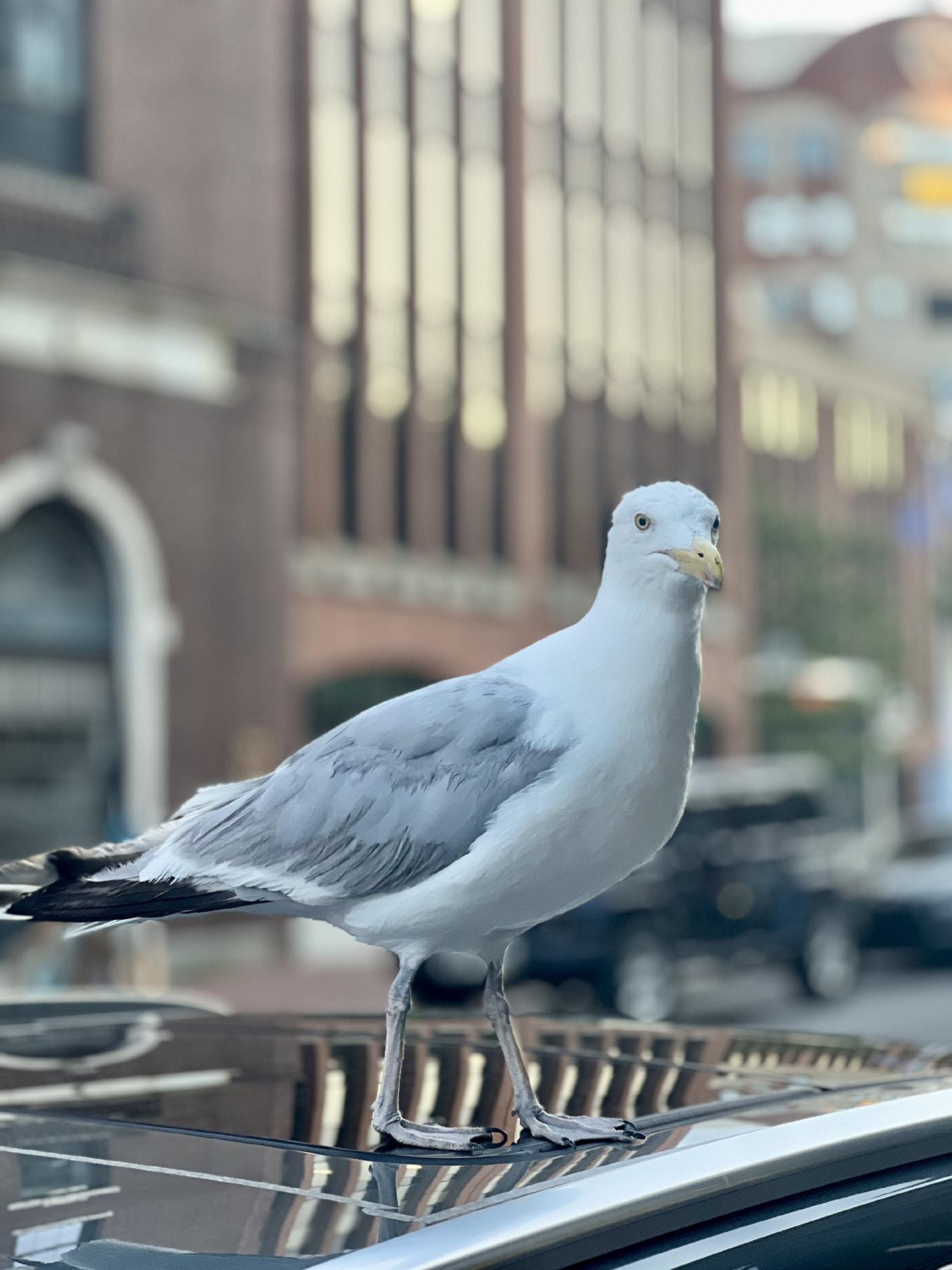
Stare Down - Liam Moran

Wampanoag-Aquinnah Trust Land - Callie Gorman
Hank Williams and Running Away
Brenna Parker
I’m not quite home.
‘Cause home was fifteen years ago and the smell of my dog’s hot breath on my face, kissing my nose until I push her away.
But I feel as if I’m arriving there.
There’s that early morning coo from the distant granddaughter of the robin whose eggs my father discovered that one spring. He yelped as grandmother robin pecked at his calloused fingers, and I laughed at him. There’s the stuffy spring nose that somehow surprises me every single year when Grandma’s tree blossoms again. But above all, the boredom reminds me of home the most. Those long, dragged-out days of summer with nothing to do but wander around the same backyard I did yesterday. The dry dirt’s dust casts a shadow on my pale legs.
Yes, I’m nearly there.
Trampoline springs and the pitter-patter of wet children’s feet followed by four paws. The warmest towel-hug ever after the splashiest pool adventure of our lifetimes. Mom and Dad spray that wasp nest, again. My sister brutally kills the one that stung me in my honor. The broken screen door Dad swore he fixed last year. The dog just ran through it again. She’ll be afraid of it for the next couple of days. Mom sings me a song before bed and tells me it was written just for me. She pushes my wet hair from my forehead. My hair’s still curly and my eyes are still blue. Why don’t you love me like you used to do?
Those were the days.
Hank Williams and Running Away
Crying as Dad pulls the splinter from my toe. He tells me, “Stay still!” I’m too ticklish for this kind of pain. I don’t yet understand that sometimes it has to hurt before it feels better. I crawl under the deck and lay with the dog in the mud. She’s the only one that understands me. I threaten to run away because I saw it in a movie. I watch spirits dance around in the same old fire pit I will burn my middle school love letters in. He didn’t deserve my love.
Now, I watch the fire.
I try to look at the flames with my childhood’s eyes, but all I see is fire. I thought I might be a time traveler, but all I am is a woman.
Hank Williams and Running Away
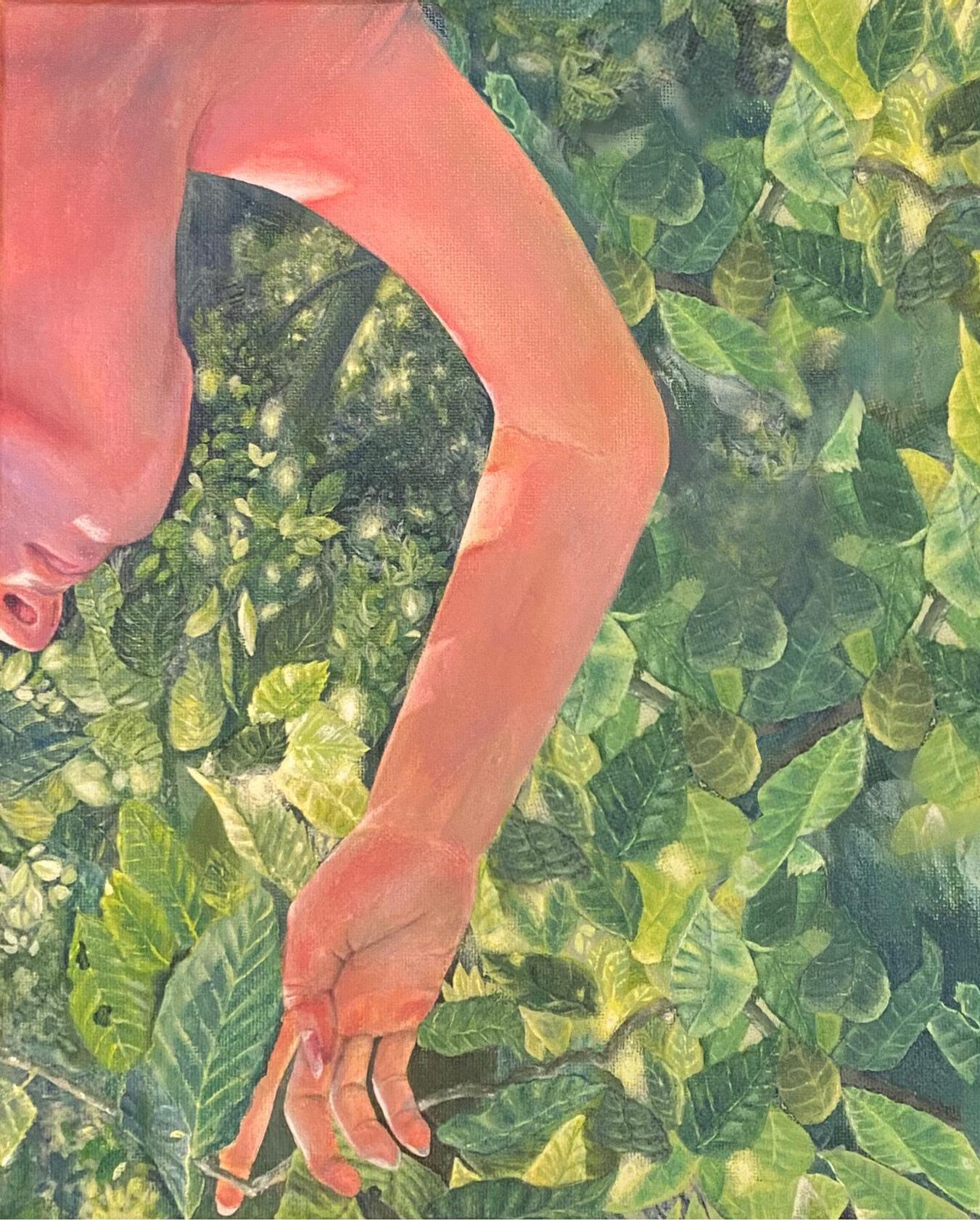
Beyond Eve’s Reach - Jessica Ely
Brenna Parker
The mixture of the air freshener I just bought and the same road the whole way is giving me this wicked headache. I pull over on the shoulder so I can pass out in peace.
But the blackout won’t come. I lean my head on the wheel and wait for the nausea to pass. My tears are just reactionary, I swear. Just like I am with everything.
I think I’d lash out at about anyone— beat them bloody if given the chance. Tell me one day I’ll be free from that white fury. Tell me one day I’ll quench that thirst.
I could probably talk myself into crying about anything if given enough time to get there. I’ll cry about my headache and my air freshener. I’ll cry about the movie I last watched, or when I can’t fall asleep fast enough. I’ll cry about how I’m crying.
I dry heave until the thoughts climb out of me already. The restlessness and the boredom and the white fury and the loneliness and that urge to drive off the road into the ditch in one final effort to be seen. I vomit brain chunks all over the passenger seat.
I wish I’d gotten out of the car and left it all out there on the road. Cleaning this up will be a nightmare. I buckle myself in and turn my signal on, and I drive it all home.
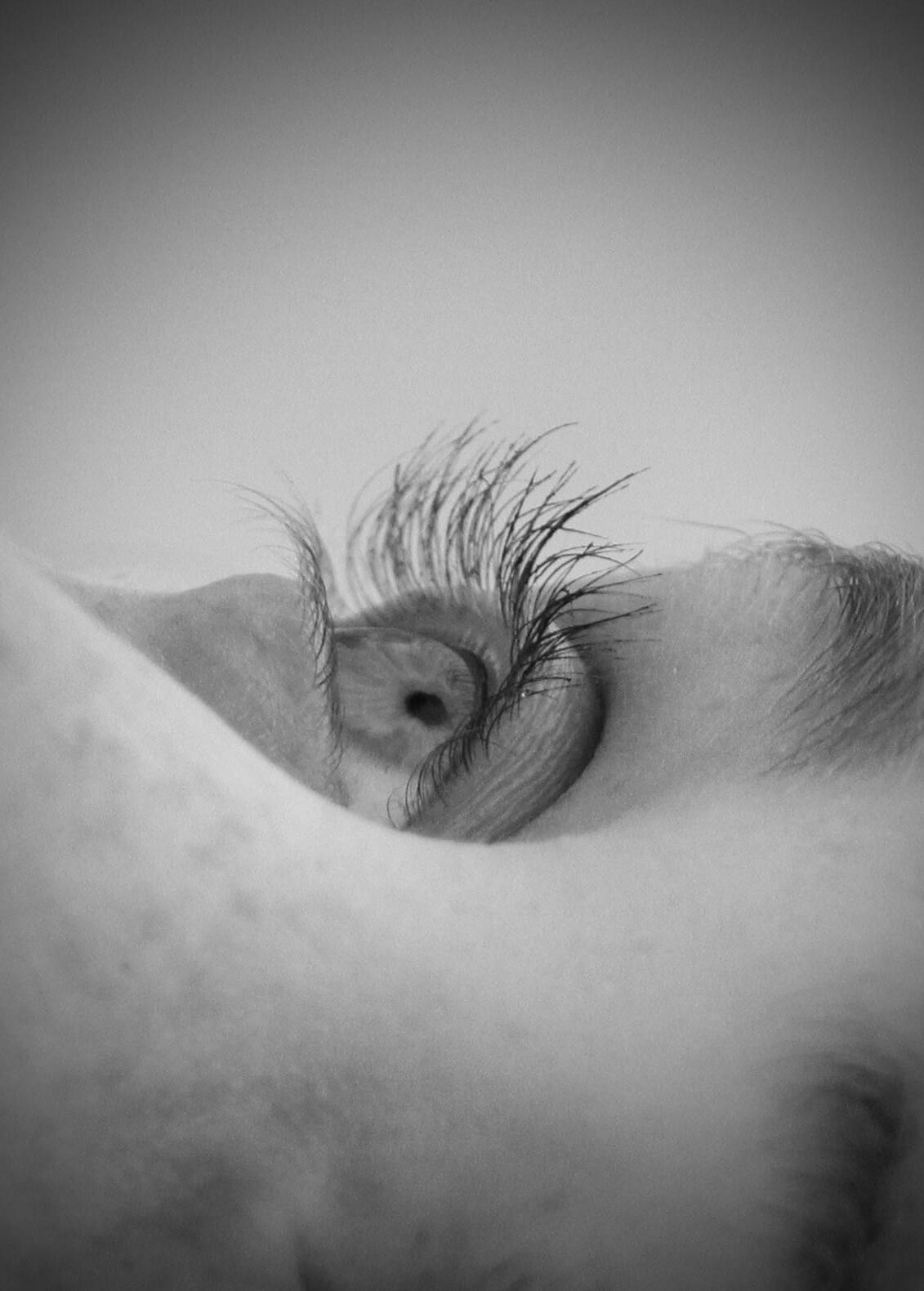
The Watcher - Stephen Butler
Camille Troy
Pink like the ribbon in my hair, Or the sunburn on your back, And the fluffy corner chair.
Red like the color of your shorts Or the heat stains on my face, And the jacket by the door.
Scarlet like the acne on your chin, Or the lipstick on my lips, And your secretive, menacing grin.
Maroon like the blood on the floor, Or the bruises on my face, And your shadow in the hall.
There’s vulnerability in pink, And secrets in red.
And sometimes when shades mix, You’re better off dead.
Shades of Red
Pole
Hailey Patts
this is a poem about telephone poles, and how
there is something comforting in the way phone lines buzz late at night. like a cat, content and satisfied, purring from its human’s gentle touch.
the sound of electricity traveling, carrying words and phrases and emotions for miles. copper wires connect us.
they know the gossip told between two high school girls, the loaf of bread accidentally left off the grocery list, the name of a newborn baby, the date of a funeral service.
the beams of wood that string these lines together extend life to where it cannot reach, while a murder of crows mourns the end of life atop the whiskery wires.
telephone poles that hold excitement, anxiety, love and pain are easy to break. a strong wind, a fast car—they split. a broken beam remains, a new pole is placed.
life goes on.
Telephone Pole
why does death take the innocent. the friendly cat that lived in the bush, frail, but open to love. a creature that yearned for the care of another.
the wires know his name, they know his diagnosis, his euthanasia date, his life.
i am in a state of mourning. perhaps i should sit atop the wires, maybe their electricity could keep me warm, the conversations flowing through them comforting.
sorry, perhaps i’ve been misleading. i’m sure you’re confused. this is not a poem about telephone poles, but rather, just one.
Telephone Pole

Standing Alone - Liam Moran
Morgan Ryan
White really isn’t Penelope’s color. The silky color of her wedding gown does nothing to complement her pale skin and blonde hair. She looks like a ghost. A disgustingly cheerful ghost.
“Oh, Evee!” she squeals. “Isn’t this dress just perfect?”
“You look beautiful, m’lady,” I say, fixing a gentle smile onto my lips—that same smile that has gotten me so far in life.
“Thank you,” she giggles. “I wonder what Vincent will think!”
Hearing that name is almost enough to knock that carefully calculated smile right off my face. Vincent. The man who is about to ruin my life.
“He’s a very lucky man,” I say, adjusting the veil atop Penelope’s head—as if she didn’t look ghoulish enough without it.
“I’m the lucky one,” she gushes. I bite my tongue. Not really. He’s the one marrying an heiress.
“I think you’re just about ready,” I tell her once the veil is laid just right. “Is there anything else I can do for you?”
I want her to say that she still needs me to do a hundred different tasks. I want her to beg me to stay.
“No, everything is perfect!” she cries, standing up and wrapping her frail arms around me. “Oh, Evee, you’re so good to me. I’m going to miss you so much.”
“I’ll miss you too,” I say, imitating her weepy voice as best I can. When I pull away, her blue eyes are filled with tears, her bottom lip wobbling as she stares at me.
I pretend to wipe tears from my own eyes. “I should probably go get ready myself!”
“Yes, of course,” she sniffles. “I won’t keep you any longer. I’m sure my mother will be here any minute. I’ll see you during the ceremony!”
Maid of Honor
“See you then.” I smile at her until I shut the door behind me. I let my shoulders sag as my natural frown takes over my face until I notice the Countess staring at me from down the hallway. She is dressed in a stuffy, mauve gown that makes her look like she’s arrived a century too late.
“Oh.” Her thin lips curl when she sees me, her pointy nose shooting into the air. “Hello, Evelyn.”
“Your ladyship,” I say, dipping into a deep curtsey as she approaches. “Lady Penelope is ready. We just finished up.”
“I’m going to miss my daughter dreadfully,” she says, lowering her voice and stepping closer until she is an inch in front of me. Her makeup is two shades too pale for her face, caked on over her wrinkles. “But the one silver lining in losing her is that I won’t ever again have to deal with the embarrassment of having you around.”
I frown innocently. “Is something wrong, ma’am?”
She narrows her eyes at me. “You know exactly what I think of you,” she hisses. “And after this wedding, Penelope won’t be around to protect you anymore.”
Penelope was always a lonely girl, clinging to people and having a very difficult time letting them go. When I became her maid five years ago and showed her the slightest bit of kindness, she decided I was her best friend in the entire world. If I had applied to any other household, I’d be helping some woman get dressed for each meal, polishing her shoes, and making her bed every morning, in exchange for a warm bed and regular meals. For any other maid in any other household, that would have been more than enough. That’s what an arrangement like ours is supposed to be.
But I wanted more, and Penelope was there to give it.
“Should I apologize for giving your daughter a friend?” I ask.
Sure, I’ve had to sit through hours of her whining and sobbing about boys, her parents, or her schoolwork, but in return, she’s considered me her friend. And friendship with Penelope has been my pass to the upper crust’s exclusive parties, where the ladies spread valuable gossip and the men look for wives. Penelope would dress me up in her fancy gowns and bring me to dinners, the opera, anywhere
Maid of Honor
she didn’t want to go alone. I ate the most delectable, decadent foods, met wealthy and powerful people, and experienced many of the luxuries reserved for the upper class.
I’ve gotten quite used to that way of life. Of course, that was before Vincent replaced me as her plus-one to everything. He’s a commoner too, but they treat him differently. He’s a wealthy businessman, not a maid. I’ve learned to ignore the way some of Penelope’s peers look at me, to hold myself with confidence and speak with sophistication. But Vincent... Vincent just walks into the room and has everyone’s respect. Everyone’s but mine.
“She will make other friends,” the Countess says, though her voice falters. “You are very easily replaceable. I doubt it will be that easy for you to replace her.”
She knows that isn’t true. Because if it was, I would have been gone a long time ago.
“I’ll see you at the wedding, ma’am.” I brush past her and make my way through the hall and down the stairs to the servants’ quarters. I have my own bedroom here at Penelope’s family’s estate—which she insisted on a few months after she declared me her friend—but Vincent has taken it over. His ginormous family has overwhelmed the house in the last few days. I take a deep breath. They’ll be gone soon enough.
When I enter, the other servants all pause what they’re doing to stare at me. They look at me the way they always do—like I’ve just killed someone—and then quickly get back to whatever it is they’re doing: repairing shoes, sewing buttons, ironing laundry. I throw my shoulders back and keep my head high as I make my way to the closet I’ve been shoved into for the week... until Vincent leaves, taking Penelope with him.
My dress is dark red, somewhere between the color of wine and the color of blood. It’s even more expensive than any of the other things Penelope let me borrow from her closet for past events. When we went dress shopping together last month, this was the one I wanted. Penelope was so upset about how it would be our last time dressing up together that she paid no mind to the price tag. Maid of Honor
I slip it on quickly, touch up my hair and makeup, and add my jewelry. I don’t have a proper vanity in here, so I use the compact mirror Penelope bought me for Christmas last year. Despite my natural beauty, despite the heaps of expensive jewels adorning me, I find nervousness creeping into my stomach. For the last five years, I’ve always vaguely felt like I’ve been hiding something. Penelope knows that I’m her maid, not a real lady—everyone knows that. So why do I suddenly have the overwhelming fear that I’m going to be found out?
I lift one of the floorboards up to check that my stash of jewels—collected from Penelope and the Countess over the years— is still there. I sigh with relief when I confirm that it is. Just in case things don’t go to plan today and I need a way out.
Once the floorboard is back in place, I smooth down the front of my dress and leave the room. Again, everyone freezes to glare at me, but some of them let their gazes linger longer than usual before returning to their work. I wonder if they know that this dress cost two years’ worth of their average salaries.
“Evelyn,” a voice croaks just before I start up the stairs. I turn to find Charles, the butler, standing in the middle of the room. “Allow me to walk you upstairs.”
Everyone’s eyes burn into me. “That’s very kind of you, Charles,” I say, fluttering my eyelashes. “Please.”
He shuffles over, his ancient knees slowing him down. He holds tightly onto my arm and the banister as we ascend the stairs, each step creaking in pain under our weight. “You look lovely,” he pants as we reach the top. “Lady Penelope was very kind to let you attend the wedding.”
“I’m her best friend,” I say.
“Apparently,” he grunts. “But I hope you haven’t forgotten your place here.”
“My place is at her side.”
“Not after today,” he says. He hasn’t let go of my arm. “You are a servant, Evelyn. You can play dress-up all you want, but once she’s gone, you’ll have to go back to being who you really are. Don’t forget what that means.”
Maid of Honor
I narrow my eyes at him. He stares right back, the crow’s feet around his eyes deepening.
“The Countess has already had to dismiss plenty of other girls,” he murmurs. “With all of her jewelry getting misplaced, and all. I doubt you’ll be missed.”
Vincent is a very modern man, mainly because he isn’t a noble. He doesn’t have a team of servants like Penelope’s family does, just a cook and a housekeeper. He told Penelope there was no need for me to go on being her maid, that he wouldn’t let me live in his house. That she would be just fine without me. He’s never exactly been fond of me. I sat there with her while she cried and cried, but eventually she let her love for Vincent overrule her love for me. She promised him she would leave me here. Alone.
I wrench my arm away from Charles. “The wedding is about to start,” I snap. “I should go.”
“I’ll see you later, Evelyn.”
The wedding is set to start in fifteen minutes, according to the clock on the wall. Fifteen minutes. I glance around, making sure no one sees me as I make my way to Vincent’s—my—room.
I open the door to find him sitting at his—my—vanity, dressed in his full tuxedo, adjusting his tie to make sure it looks perfect for his bride.
I approach him on light feet, reaching into my pocket. By the time he turns and realizes I’m there, it’s already too late.
Black really isn’t Penelope’s color. The shadowy folds of her dress contrast garishly with her pale skin. It’s a good thing her dark veil and gloves cover every inch of it.
She clutches my arm and sobs as they lower Vincent into the ground. The Countess tries to comfort her, but Penelope’s only focus is on me.
The coroner ruled it a suicide. A single gunshot to the head, the weapon found beside him. No one saw anyone else around. They suspect he got cold feet before the wedding, that he couldn’t handle the pressure of marrying up.
Maid of Honor
Everyone leaves the grave one by one, but Penelope stays. So I stay. I listen to her bawl until she has no tears left, gently rubbing her back and handing her tissue after tissue.
“I can’t believe it,” she sniffles after hours have passed, her voice scratchy and her eyes swollen. She wraps her arms around me and buries her face in my shoulder. “I’m so glad you’re here, Evee. I have no idea what I’d do without you.”
“It’s all right, Penny,” I whisper. “I’m right here. I’ll always be here.”
Maid of Honor

Alone in Winter - Stephen Butler
Stephen Butler
Every year I reach September. The leaves begin to turn And so do I.
Grey skies replace blue ones
As the chill in the air finally reaches Into my heart
And the sunset creeps earlier. We used to watch them. Darkness takes over
And I begin to wonder once again What will this September bring?
Every year I reach September. Always another reminder of the friends I’ve lost. This reminder lives in the cold air that paints over my eyes, Painting them red
I don’t know where you are. Are you still here with me?
You are frozen in September. The tears in my eyes stop fighting gravity And the colors bleed, But I don’t.
I keep walking forward.
September
I made it through September. Leaving you behind Leaving all I’ve lost
Another year alone
But it isn’t time for me to join you just yet. Will you love me again when I do?
I don’t know what will come next. Soon the days will fall even shorter And curtains of snow will draw over what was left behind This September. It’s October now. September

Zenith - Stephen Butler
Grace Nitowski
One day, I will walk into a classroom for the first time. Clad in Kelly green slacks, topped with a wool sweater and a proud ID badge, I will no longer be the student. I will no longer scribble notes in the back of the classroom on whether the teacher probed convergent questions or scaffolded their lesson to reach all students. I will no longer leave my dorm room at six a.m. eager to consider the teacher’s engagement with students’ IEPs. I will no longer submit lesson plans I’ll never use, instead, I’ll plan my own.
One day, my students and I will embark on literary adventures. We will dive into the works of Fitzgerald, Atwood, Lee, Shakespeare, Hinton, and Bradbury with a hint of my own zeal. We will argue on what the author intended to teach us within our two window, four corner, one doored classroom of twenty-two students. We will wrestle with texts I know they will not remember a line from. But that is not my job. My job will not be to teach them that Juliet loved Romeo more than he loved her, but that family cannot defy the feelings they have for their senior prom date or future college crush. My job will be to show them the warning signs The Handmaid’s Tale shows us about our own government corruption and what our society could look like if the 19th Amendment was revoked. My job is to get them to read. Learn. That’s all in the lesson plan.
One day, I will give a test. I will not give the 10 multiple choice, 2 open ended, 1 essay test because I want to, but because the school scrapes up 45k and obliges me to do it. I will sit during their test and study. I will manage my classroom inventory in my mind. Two windows, with about a four-foot drop to the ground. We’d be in the courtyard. One door with a paper window shade. Four corners, the farthest being in the back right. Out of sight from the door. Twenty-two students. Taking a test, just like I said in my lesson plan.
The Lesson Plan
One day, I will read my students’ writing. I will read tales on parental trauma, shattered friendships, lost pets, suicidal thoughts, depression, heartaches. I will read their silent struggles with a mixture of empathy and gratitude for their trust in me. I will be their teacher, their mentor. Yet, I will curse my hand which scored my name, grappling with the weight or responsibility as a mandated reporter, bound by duty to act on their confessions. Not in my lesson plan.
One day, I will walk into a classroom and take my test. The test that was never in my lesson plan. There will be a lockdown alert. One I was not made aware of. I will lock my one door. Pull down my two window shades. I will check my inbox from the corner of the classroom. I will hush my students. My readers, learners. I will take my test, throwing them into the farthest right corner. I will listen to the rattle of my doorknob and say a silent prayer that it is our principal and not the child who sits in the front row of my 2nd period class. The child who just wrote an essay that his mom drinks too much and he can’t seem to find any friends. The same child I prayed for the night before.
When the hand pounds at my door I will assess whether there is enough time to open my windows and toss my readers out the window. In mere seconds, I will determine if I should grab the bucket of twenty-five stones I collected from my flowerbed. It will sit in my closet, just as it sat in my own high school teacher’s. Three extras, just in case. I will determine if I should stand at the door, sacrifice myself in front of my learners. My future doctors, lawyers, nurses, mothers, fathers. I will determine whether my obituary reads “brave” amongst a clutter of adjectives and people I loved most.
One day, I will teach.
The Lesson Plan
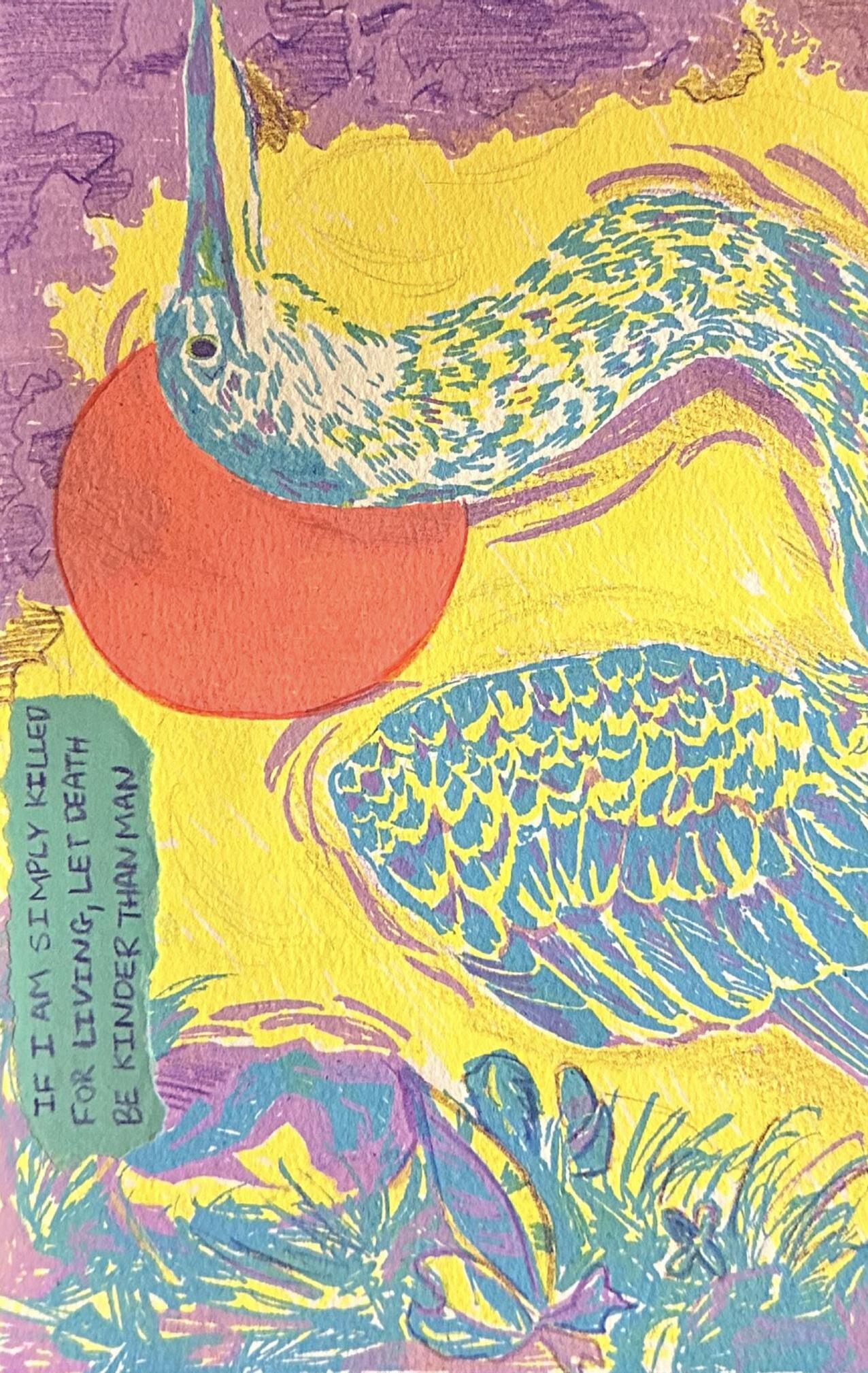
Days End - Jessica Ely
Emily Carey
Set the world ablaze, my love. But you are the world. Light me up the same.
Contributors
Christina Andreopoulos is a freshman secondary education English major.
Stephen Butler is a senior neuroscience major in the Magis Honors Program.
Emily Carey is a junior public policy & service and philosophy double major in the SJLA and University Honors Programs.
Patrick DelBalso is a senior biochemistry, cell & molecular biology and philosophy double major in the SJLA and Magis Honors Programs.
Shubhat Dhungel is a senior accounting major.
Jessica Ely is a junior physiology major.
Callie Gorman is a sophomore biology major in the Magis Honors Program.
Victoria Lewis is a senior physiology major.
Faith Montagnino is a junior English major in the SJLA and University Honors Programs.
Liam Moran is a senior biology and philosophy double major in the SJLA Program.
Grace Nitowski is a senior secondary education English major.
Hailey Patts is a junior biochemistry major in the Magis Honors Program.
Brenna Parker is a senior English major.
Zane Price is a senior secondary education English major.
Morgan Ryan is a sophomore advertising major.
Camille Troy is a sophomore health promotion major.
Meghan Wong is a freshman neuroscience major in the Magis Honors Program.
Acknowledgments
Esprit appreciates the kind support of:
Valarie Clark
Melissa Eckenrode
Britney Walsh
Michael Paolello
Joseph Kitcho
Bethany Belkowski
Rich Larsen
Katie Till
Glen Pace
Stephen Whittaker
Jenny Whittaker
CLP Physical Plant Staff
Vince Merkel
Coilin Murray
Sam Williams
Deanna Beyrent
Carl Hurst
James Gaffney
Bill Hurst
Susan Méndez
Carolyn Barry
Bridget Hunter
The Other
Esprit Submission Information
Esprit, a review of arts and letters, features work by students of The University of Scranton and is published each fall and spring as a cocurricular activity of the English department.
We will consider a maximum of five visual art submissions and five literary submissions (poetry and/or prose) per author/artist. Esprit does not accept resubmissions, works currently under consideration elsewhere, previously published works, or works published to social media accounts.
Manuscripts (Electronic Submission)
Original stories, poems, essays, translations, features, sketches, humor, satire, interviews, reviews, and short plays must be typed and saved in Microsoft Word file format (.docx). All manuscripts, except poetry and short plays, must be double-spaced. Every page of the manuscript must list the title and page number in the upper right corner. It is recommended that all manuscripts be submitted in 12-point Times New Roman font. The author’s name must NOT appear at any point in the manuscript to ensure that all submissions are judged anonymously. Each submission is to be saved as a separate Word file, and all submissions are to be attached to a single email and sent to espritsubmissions@scranton.edu from the author’s University email account.
The body of the email must contain the following information:
Writer’s name
Royal ID number
Year in school and enrollment status (full-time or part-time)
Major(s) and honors program(s) (Business Honors, Business Leadership, Honors, Magis, or SJLA)
Genre(s) of submissions emailed (poetry or prose)
Title of each work submitted in the listed genre(s)
If you are submitting a work of translation, please include a copy of the original text along with your translation.
Submissions received late, mislabeled, or emailed without all of the above information will NOT be considered.
Graphics (Electronic Submission)
Black and white/color photographs and pen and ink drawings work best in this format, but pencil drawings, collages, and paintings will be considered. Your name must NOT appear anywhere on the submission(s). Upload
your submission(s) to OneDrive through your my.scranton email account in the highest possible quality, and share that OneDrive file in an email to espritsubmissions@scranton.edu
The body of the email must contain the following information:
Artist’s name
Royal ID number
Year in school and enrollment status (full-time or part-time)
Major(s) and honors program(s) (Business Honors, Business Leadership, Honors, Magis, or SJLA)
Title of each work submitted
Medium of each work submitted (photography, painting, charcoal, etc.)
If submitting OneDrive files please add both espritsubmissions@scranton. edu and melissa.eckenrode@scranton.edu to file permissions.
When the work submitted is a study of, or is otherwise dependent upon, another artist’s work, please supply the other artist’s name and that work’s title.
Submissions received late, mislabeled, or without all of the above information will NOT be considered.
All submissions are reviewed anonymously. All accepted submissions to Esprit that are the work of currently enrolled full-time undergraduates at The University of Scranton will be considered, according to genre, for The Berrier Prose Award ($100), The Berrier Poetry Award ($100), and The Esprit Graphics Award ($100).
Please do NOT address questions regarding submission policy to espritsubmissions@scranton.edu; this email address is expressly for receiving submissions and will not be accessed until the Esprit submission deadline has passed. Questions should instead be addressed to Zane Price (zane.price@scranton.edu).
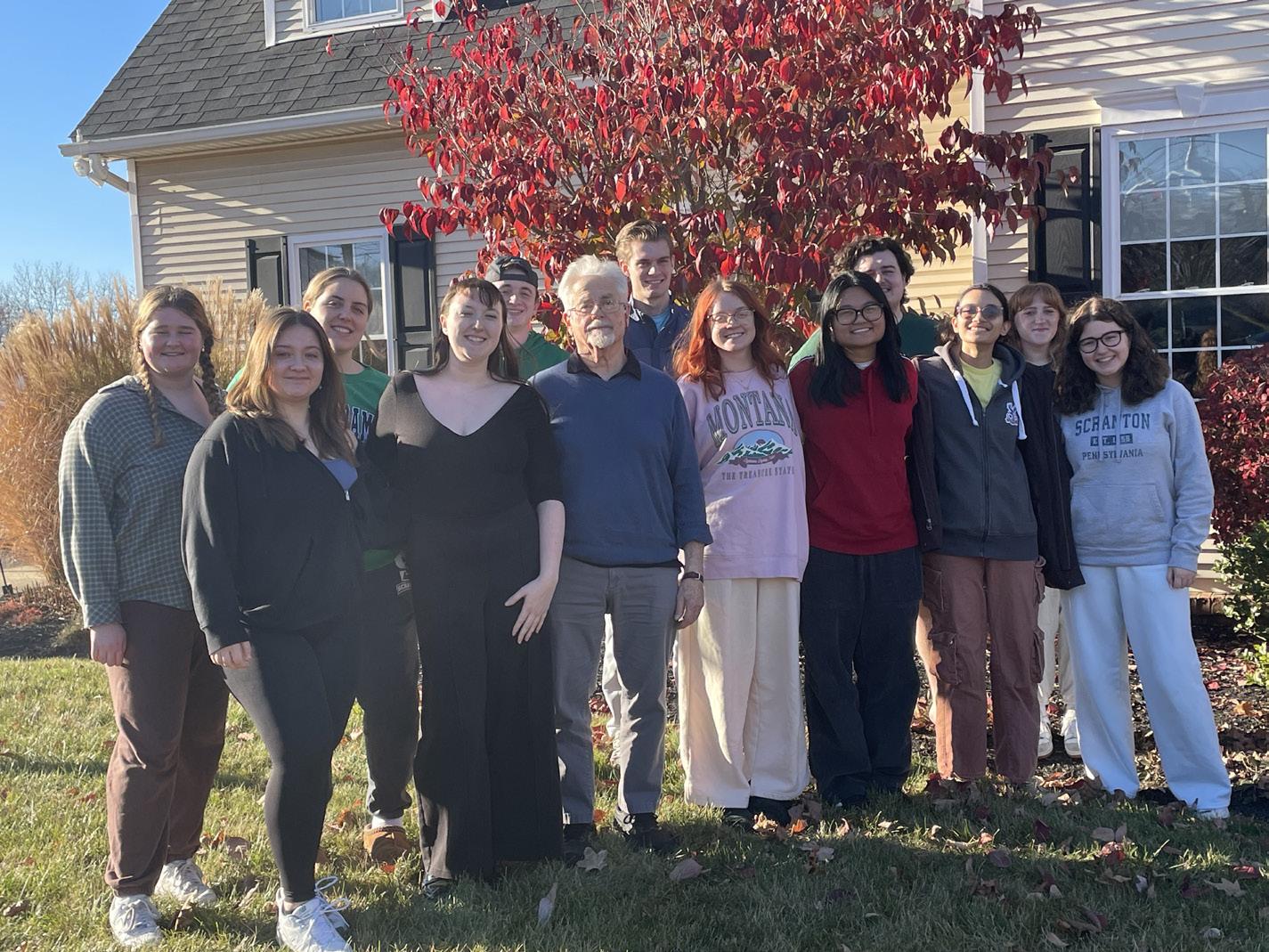
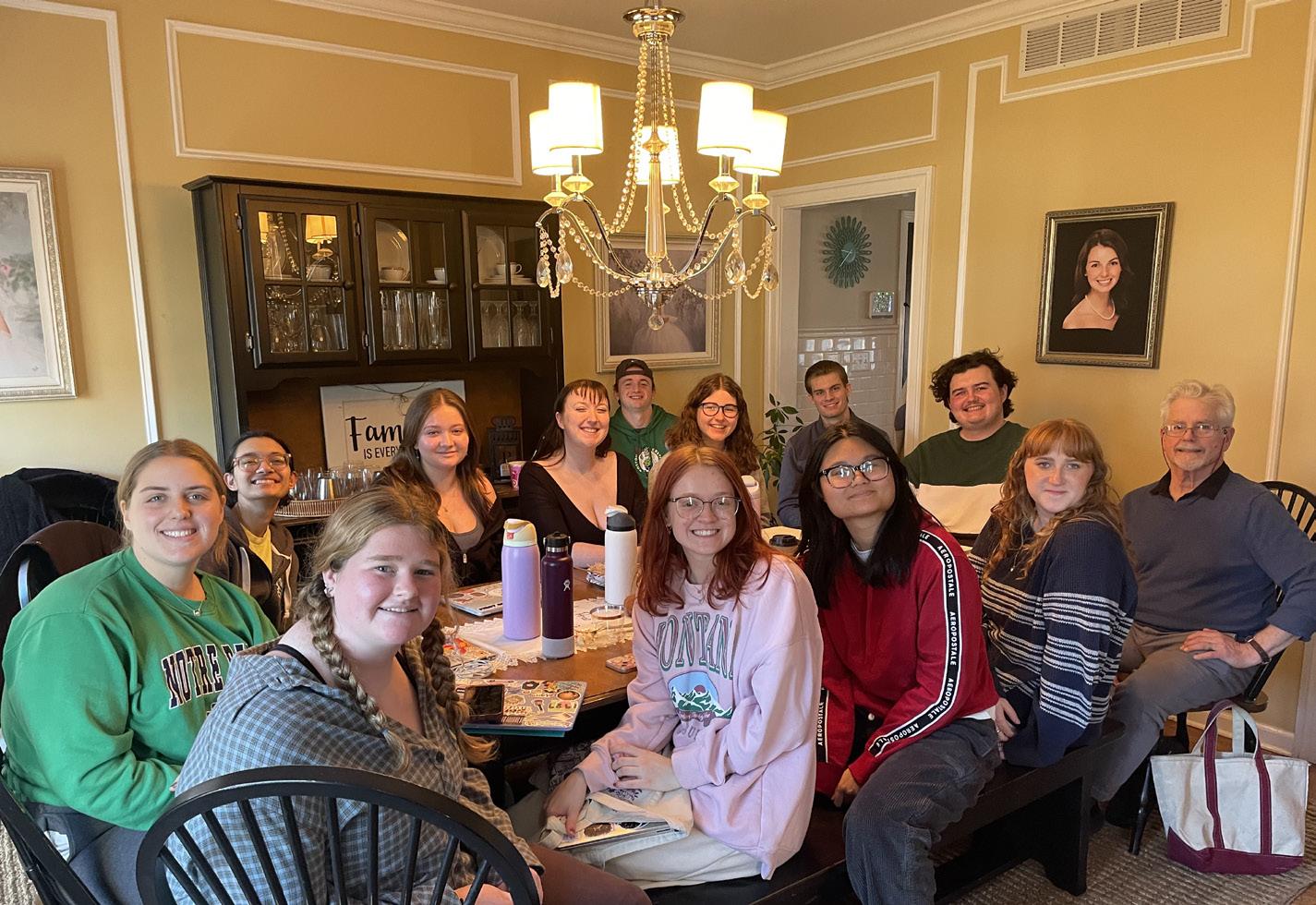
Staff Fall 2024
